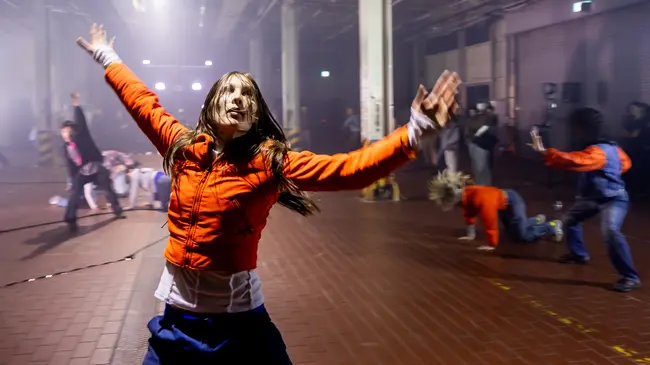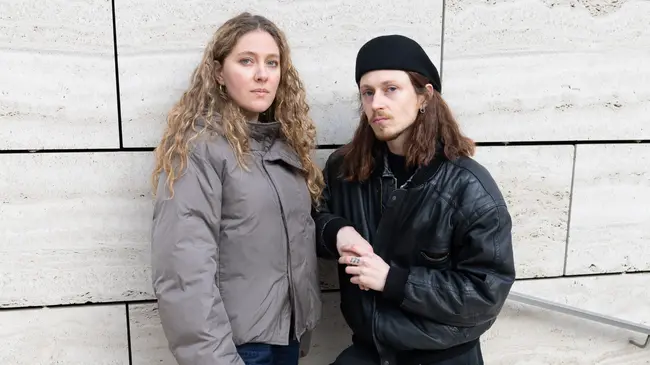It is not easy being a poet these days

Kiluanji Kia Henda is an Angolan conceptual artist whose first Belgian solo exhibition is to be visited in M Museum until the end of the month. Kia Henda is a storyteller on a quest to find common ground. We talk to him on a blue-skied day over the phone. And while the phone connection might be a little crackling, his message travels through clearly: it is not easy being a poet these days.
One of the themes in your work is power and the dynamics of supremacy. What do you believe is the power of art?
Art makes people have a second thought
(Laughs) Well… that is a difficult question. For me, I believe that art is an efficient way of communicating. It is a way to understand different societies and also a way to denounce many of the atrocities happening around us. Art makes people have a second thought, and read further into things than what ordinary life gives. And also: art is a space. A space of observation but at the same time, space where questions are raised.

Throughout time and space, there are different waves and groups of people who hold on to different kinds of poetics, stating what art is or should be. One of them states that art is beauty. Do you agree?
Beauty is part of aesthetics, and beauty is necessary to attract attention. But at the same time, beauty is shallow. Art concerns feelings and emotions, art needs a soul. When you state that art is or should be beautiful, you are talking about an object and I don’t believe in that kind of disconnection that lays in the focus on the object. That is just not sincere or honest. I think art should have a message and should be socially and politically committed.


You call yourself a conceptual artist. Why is that?
Actually, I kind of rolled into visual arts by accident. When I was younger, I was interested in music and literature and film. Then I wanted to be a soccer player. But I think when I rolled into the visual arts world, being ‘conceptual’ was a way for me to be able to use all of the interests I had before. I am not a ‘conceptual artist’ in an arty way, I start from a story I want to tell and then I choose how it is told best. I am not technically smart - I am in fact a very bad photographer. Then again, it is not really the medium I am interested in, but the story I want to tell.
It is not really the medium I am interested in, but the story I want to tell
And how would you say your work evolved throughout the years?
Medium-wise, I started out with photography and the stories led me to use installations, performance, video, etc. The evolution of my work happened very naturally and very gradually. Never did I want to use different media, because that is just what artists do nowadays. The art forms I choose draws from the need to tell a story.


So your use of media evolved by the kind of stories you wanted to tell. Do you also see an evolution in the kind of stories you feel you need to tell?
Yes, of course. As a starting artist in Angola, I was focused mainly on local issues. But as I travelled, I felt the need to understand the puzzle I am and where I came from. I needed to travel across the borders, of history and of the nation. I broke out of the continental platform. The act of travelling very much changed the stories I wanted to tell. I want to create bridges to different realities and find connections. Talking about connecting things and about humanity has very much become something naïve. But I feel our humanity is failing, so maybe we should be more naïve and we should talk about humanity so that we come to a point where there are no borders, no continents and we can come together and find our common ground.

Talking about travelling: travelling through history is a returning element as well in your work. How does (your) history define your work?
History is my cursed muse. I feel that in the continent I am from, there are two major issues: the access to history, and the ability to plan your own future. The present is of lesser importance. You get stuck focusing on the present. As art is playing with fiction, it allows you to play with temporality. That can be utopic, but also very urgent. We should breach the past and the present because that is what makes us great. This has honestly been challenging for me because it takes a lot of effort to try and get away from present problems and abstract myself. To always try having some poetry. With everything surrounding us, it is not easy being a poet today.
Different Class works with the interest of their community at heart.
Our work’s purpose is to foster a solid network for independent artists, those who love them, and those who want to support them. Become a member to contribute to the local Belgian art scene.





